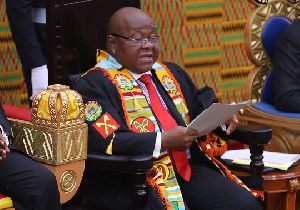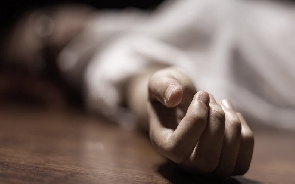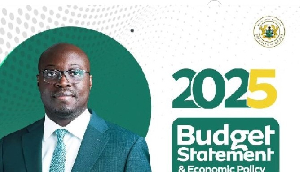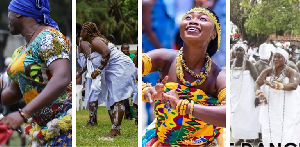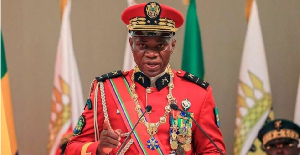In an attempt to justify their unprovoked military attack against Libya and for that matter Africa, the US and her so-called allies are doing everything to portray Ghaddafi as a criminal and a monster that is insensitive to the plight of his people. Undoubtedly, human as he is, Muammar Ghaddafi has shortcomings but does he deserve to be vilified, humiliated, and demonized as is being carried out by the West? To me, the Libyan oil factor is more glaring than anything else. What do you think?
Certainly, some political leaders around the world including those from America and Europe cannot escape blame for corruption and other excesses, military invasion can never be the best solution and it’s about time civil society began to question the motives behind America’s hasty military attacks around the world. I reproduce below (courtesy of research sources) some basic facts about Libya under the regime of Ghaddafi and invite the general public especially Africans to judge for themselves whether the ongoing military aggression on their native land against Libya is justified after all. This is because perception is one thing and reality is another but truth shall always prevail over falsehood.
Educational Sector: Libya's population includes 1.7 million students, over 270,000 of them study at the tertiary level. Basic education in Libya is free for all citizens, and compulsory to secondary level. The literacy rate is the highest in North Africa; over 82% of the population can read and write. After Libya's independence in 1951, its first university, the University of Libya, was established in Benghazi. In academic year 1975/76 the number of university students was estimated to be 13,418. As of 2004, this number has increased to more than 200,000, with an extra 70,000 enrolled in the higher technical and vocational sector.
Since 1975 the number of universities has grown from two to nine and after their introduction in 1980, the number of higher technical and vocational institutes currently stands at 84 (with 12 public universities). Libya's higher education is mostly financed by the public budget, although a small number of private institutions have been given accreditation lately. In 1998 the budget allocated for education represented 38.2% of the national budget. The main universities in Libya are: Al Fateh University (Tripoli), Garyounis University (Benghazi), University of Omar Almukhtar (Al Bayda), The Higher Institute of Computer Technology Also known as The College of Computer Technology (Tripoli), and the Higher Institute of Electronics (Tripoli).
The economy: The Libyan economy depends primarily on revenues from the oil sector, which constitute practically all export earnings and about one-quarter of gross domestic product (GDP). The discovery of the oil and natural gas reserves in the country in 1959 led to the transformation of Libya's economy from a poor country then, to Africa's richest. The World Bank defines Libya as an 'Upper Middle Income Economy', along with only seven other African countries. In the early 1980s, Libya was one of the wealthiest countries in the world; its GDP per capita was higher than that of developed countries such as Italy, Singapore, South Korea, Spain, and New Zealand. Today, high oil revenues and a small population give Libya one of the highest GDPs per capita in Africa. Libya state provides an extensive level of social security, particularly in the fields of housing and education. However; unemployment is considered high according to the latest census figures.
Compared to its neighbors, Libya enjoys a low level of both absolute and relative poverty. In the past six years the Ghaddafi regime has carried out economic reforms as part of a broader campaign to reintegrate the country into the global capitalist economy. Libya has begun some market-oriented reforms. Initial steps have included applying for membership of the World Trade Organization, reducing subsidies, and announcing plans for privatization. Authorities have privatized more than 100 government owned companies since 2003 in industries including oil refining, tourism and real estate, of which 29 are 100% foreign owned.
The non-oil manufacturing and construction sectors, which account for about 20% of GDP, have expanded from processing mostly agricultural products to include the production of petrochemicals, iron, steel and aluminum. Climatic conditions and poor soils severely limit agricultural output, and Libya imports about 75% of its food. Water is also a problem, with some 28% of the population not having access to safe drinking water in 2000. The Great Man-made River project by Ghaddafi is to tap into vast underground aquifers of fresh water discovered during the quest for oil, and is intended to improve the country's agricultural output. Under the Ghadafi regime, Libya has undergone accelerated business boom, as a result many international oil companies have returned to the country, including oil giants Shell and ExxonMobil. A multi-million dollar renovation of Libyan airports has recently been approved by the government to help meet such demands as increased tourism. At present 130,000 people visit the country annually; the Libyan government hopes to increase this figure to 10,000,000 tourists. Saif al-Islam al-Gaddafi, the second-eldest son of Muammar Gaddafi, is involved in a green development project called the Green Mountain Sustainable Development Area, which seeks to bring tourism to Cyrene and to preserve Greek ruins in the area.
Demographics: Libya is a very large country with a very small population of 6.5 million, around half of whom are under 15 years but the population is actually concentrated very narrowly along the coast. Population density is about 50 persons per km² (130/sq. mi.) in the two northern regions of Tripolitania and Cyrenaica, but falls to less than one person per km² (2.6/sq. mi.) elsewhere. Ninety percent of the people live in less than 10% of the area, primarily along the coast. About 88% of the population is urban, mostly concentrated in the three largest cities, Tripoli, Benghazi and Al Bayda. In 1984 the population reached 3.6 million and was growing at about 4% a year, one of the highest rates in the world. Native Libyans are primarily Berbers; Arabized Berbers and Turks; ethnic "pure” Arabs, mainly tribal desert "Bedouins"; and Tuareg. Small Hausa and Tebu tribal groups in southern Libya are nomadic or semi nomadic. There are about 140 tribes and clans in Libya. Family life is very important for Libyans, the majority of which live in apartment blocks and other independent housing units, with precise modes of housing depending on their income and wealth. An unknown small number of Libyans still live in the desert as their families have done for centuries. Most of the population has occupations in the oil and gas industry, and services, and a small percentage is in agriculture. In 1995, Libya was divided into thirteen districts (shabiyah), in 1998 into twenty-six districts, and in 2001 into thirty-two districts. These were then further rearranged into twenty-two districts in 2007. Libyan districts are further subdivided into Basic People's Congresses which administer Townships and Boroughs. Among foreign residents, the largest groups are citizens of other African nations, including North Africans (primarily Egyptians), and Sub-Saharan Africans. In 2011, there were also an estimated 60,000 Bangladeshis, 30,000 Chinese and 30,000 Filipinos in Libya. Libya is home to a large illegal population which numbers more than one million, mostly Egyptians and Sub-Saharan Africans. Libya also has small Italian minority settlers.
Language and Culture: The main language spoken in Libya is Arabic (Libyan dialect) by 80% of the Libyans, and Modern Standard Arabic is also the official language. Italian and English are sometimes spoken in the big cities, although Italian speakers are mainly among the older generation. Libya is culturally similar to its neighboring Maghrebian states and they consider themselves very much a part of a wider Arab community. Libya boasts of few theatres or art galleries. For many years there have been no public theatres, and only a few cinemas show foreign films.
The tradition of folk culture is still alive and well, with troupes performing music and dance at frequent festivals, both in Libya and abroad. Some common Libyan foods include couscous, bazeen, which is a type of unsweetened cake, and shurba, which is soup. Libyan restaurants may serve international cuisine, or may serve simpler fare such as lamb, chicken, vegetable stew, potatoes and macaroni. Alcohol consumption is illegal in the entire country.
Foreign Relations: Libya's foreign policies have fluctuated sinc e 1951. As a Kingdom, Libya maintained a definitively pro-Western stance, yet was recognized as belonging to the conservative traditionalist bloc in the League of Arab States (the present-day Arab League), of which it became a member in 1953. The government was also friendly towards Western countries such as the United Kingdom, United States, France, Italy, Greece, and established full diplomatic relations with the Soviet Union in 1955. After the 1969 coup, which brought Muammar Gaddafi to power, he abolished the monarchy and established what he called the peoples’ power. He also closed American and British military bases and partly nationalized foreign oil and commercial interests in Libya.
In 1999, less than a decade after the UN sanctions were put in place, Ghaddafi began to make dramatic policy changes in regard to the Western world, including turning over the Lockerbie suspects for trial. This diplomatic breakthrough followed years of negotiation, including a visit by UN Secretary General Kofi Annan to Libya in December 1998, and personal appeals by Nelson Mandela. Eventually the US and the UK accepted a trial of the suspects in the Netherlands under Scottish law, with the UN Security Council agreeing to suspend sanctions as soon as the suspects arrived in the Netherlands for trial.
Following the fall of Saddam Hussein's regime in 2003, Gaddafi decided to abandon his weapons of mass destruction programs and pay almost 3 billion US dollars in compensation to the families of Pan Am Flight 103 and UTA Flight 772. The decision was welcomed by many western nations and was seen as an important step toward Libya rejoining the international community. Since 2003 the country has made efforts to normalize its ties with the European Union and the United States and has even coined the catchphrase, 'The Libya Model', intended to show the world what can be achieved through negotiation, rather than force, when there is goodwill on both sides.
By 2004 George W. Bush had lifted the economic sanctions and official relations resumed with the United States. Libya opened a liaison office in Washington, and the United States opened an office in Tripoli. In January 2004, the first official US Congressional delegation visited Libya. In 2007 Ghaddafi released five Bulgarian nurses and a Palestinian doctor, who had been held since 1999, charged with conspiring to deliberately infect over 400 Libyan children with HIV and this was seen as marking a new stage in Libyan-Western relations. The United States removed Gaddafi's regime, after 27 years, from its list of states sponsoring terrorism.
On October 16, 2007, Libya was elected to serve on the United Nations Security Council for two years starting in January 2008. In February 2009, Gaddafi was selected to be chairman of the African Union for one year. In 2009 the United Kingdom and Libya signed a prisoner-exchange agreement and Libya requested the transfer of the convicted Lockerbie bomber, who returned home in August 2009. On August 30, 2008, Gaddafi and Italian Prime Minister Silvio Berlusconi signed a historic cooperation treaty in Benghazi. Under its terms, Italy will pay $5 billion to Libya as compensation for its former military occupation. In exchange, Libya will take measures to combat illegal immigration coming from its shores and boost investments in Italian companies. The treaty was ratified by both countries during a visit to Tripoli by Berlusconi. In June Gaddafi made his first visit to Rome, where he met Prime Minister Berlusconi, President Giorgio Napolitano, Senate President Renato Schifani, and Chamber President Gianfranco Fini, among others. In May, 2010, Libya was elected by the UN General Assembly to a three-year term on the UN's Human Rights Council but was suspended in March, 2011 in the wake of the current crises.
The Media: Libyan television is devoted to showing various styles of traditional Libyan music. Tuareg music and dance are popular in Ghadames and the south. Libyan television programs are mostly in Arabic with a 30-minute news broadcast each evening in English and French. The government maintains strict control over all media outlets. To reverse this, the government announced plans to introduce private media; an initiative intended to update the country's media.
Religion: The predominant religion in Libya is Islam with about 97% of the population associating with the faith. The vast majority of Libyan Muslims adhere to Sunni Islam, which provides both a spiritual guide for individuals and a keystone for government policy, but a minority (between 5 and 10%) adheres to Ibadism (a branch of Kharijism). Gaddafi asserts that he is a devout Muslim, and his government supports Islamic institutions and programs worldwide. Apart from the overwhelming majority of Sunni Muslims, there are also small foreign communities of Christians in Libya which was until recent times the home of one of the oldest Jewish communities in the world, dating back to at least 300 BC. Political Stability: Libya has been politically stable for over four decades under the watch of Colonel Muarmar Ghaddafi with his so-called “power to the people” revolutionary concept. Precious readers, the rest is for you to judge for yourselves.
By the way, I am particularly saddened by the loud silence of African leaders and their regional groupings – the AU, THE SADC, THE ECOWAS etc, etc. who have benefited from the generosity of Brother Ghaddafi over the years. Is the Blackman not capable of managing his own affairs? Nkrumah must be weeping in his grave. Let there be awakening in Africa because the SHARKS (so-called super powers) always seek their own interest. Africa Must Unite!!
By: Justice Afrikhan.
Opinions of Sunday, 27 March 2011
Columnist: Afrikhan, Justice


